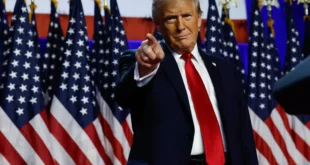Emanuela Gillard
The recent assassination attempt on former President Donald Trump has ignited a swirl of controversies in American politics. With Trump polling well and gaining momentum in the presidential race, this incident, coupled with a recent TV debate, seems to have bolstered his appeal—even among some independent voters. As President Joe Biden’s potential withdrawal from the race in favor of Vice President Kamala Harris shakes things up, another pressing question arises: How would a second Trump presidency reshape U.S. foreign policy?
Trump’s Transactional Approach
At the heart of Trump’s foreign policy is a transactional mindset. He views international relations through the same lens as business deals, boasting about his knack for making “profitable” agreements. This perspective allows for the use of brute force in politics, a tactic Trump does not hesitate to employ when he deems it necessary.
His rationale for using force is punitive rather than transformative; he sees no obligation for the U.S. to resolve other nations’ security issues or to influence their domestic affairs. Instead, Trump believes that U.S. intervention should only occur when American interests are directly threatened. In this framework, the use of force is not just an option but often the first choice if vital U.S. interests are at stake. His goal is to project power to bolster U.S. credibility.
This philosophy can be summed up as isolationist unilateralism. While not isolationism in the traditional sense, Trump’s approach tends to favor unilateral action over multilateral cooperation. Allies are often regarded as burdens, expected to “pay their fair share” if they wish to receive U.S. protection. Thus, punitive unilateralism becomes the hallmark of Trumpian foreign policy.
A Less Restrained Foreign Policy
If Trump were to win decisively, he would likely operate with fewer constraints from Republican elites and the foreign policy establishment. This relative freedom would allow him to appoint a cohesive team aligned with his worldview, ensuring a more unified approach than during his first term.
The international context also favors a more assertive U.S. stance. Since the end of the Cold War, the U.S. has enjoyed a favorable position in the global balance of power. Neither Russia nor China poses an immediate threat to U.S. hegemony, providing Trump with a significant degree of autonomy in shaping foreign policy. This structural advantage means that U.S. engagement in global affairs is primarily a matter of choice for the president.
Key Conflict Zones
Three critical hotspots will dominate Trump’s foreign policy agenda: Ukraine, Gaza, and Taiwan. Trump has asserted that the war in Ukraine would not have occurred if he were still in office, and he has criticized U.S. aid to Kyiv. However, he will have to confront the realities on the ground, where a complete overhaul of Ukraine policy may be unrealistic. Instead, he might pursue renegotiation, hoping for a more favorable compromise with Russia.
In Gaza, Trump could see the situation as a proving ground for U.S. resolve and influence. The Middle East has historically been a theater for U.S. assertiveness, and it wouldn’t be surprising if Netanyahu’s administration aimed to stay in power until Trump potentially assumes office. They likely view Trump as more favorable than Biden, expecting him to alleviate pressure on Israel.
Regarding China, Trump’s first term was marked by trade wars and aggressive rhetoric. However, he does not appear to be using the Taiwan issue to provoke China and has even signaled a potential reduction in U.S. commitment to defending Taiwan in case of a geopolitical crisis.
Conclusion
Understanding Trump’s worldview and the external factors that shape it is essential for grasping the future of U.S. foreign policy. In a possible second term, the interplay of Trump’s preferences, domestic political constraints, and the international landscape will jointly dictate U.S. actions on the global stage. As the world watches closely, the implications of a second Trump presidency could signal a return to an isolationist unilateral foreign policy, reshaping America’s role in international affairs for years to come.
 Geostrategic Media Political Commentary, Analysis, Security, Defense
Geostrategic Media Political Commentary, Analysis, Security, Defense





